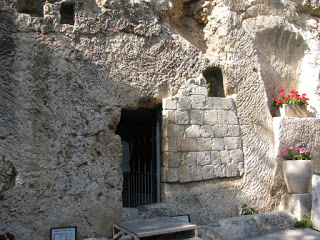Easter Weekend Devotionals
Our Easter Weekend Devotionals include scripture, meditations, and directed introspection for Good Friday, Silent Saturday, and Resurrection Sunday. Use them to draw closer to our Lord and experience the power, mercy, and grace of the greatest gift ever given: redemption through the blood of Jesus. Easter Weekend Devotional: Good Friday Remembering the Cost The crowds cheered and shouted Hosanna. Palm branches lined the path. The King for whom they waited finally arrived. Their shouts echoed through the streets of Jerusalem. They were the first voices of the week, but they weren’t the last. (John 12:12-13) Jesus heard so many voices that week. Praise. Love. Arguments. Pride. Betrayal. Condemnation. Denial. Fear. Sorrow. Those who loved Him most failed Him in scandalous ways. Their voices were the worst of the lot. “How much will you pay me?” “Give me the best seat.” “I never knew Him.” Let’s ponder a moment… If we’d been there, what would our voices say? Would we beg for the best seat next to Him or let fear drive us to deny Him? Might we join the crowd in condemnation and cries to crucify Him? Yes. Any of that. Possibly all of it. We were at fault and to blame. We all sinned, all fell short of His glory, His standard, and His love. (Romans 3:23) The problem isn’t an ancient “them,” it’s us. Every single one of us is a sinner and, together, we drove Him to the cross. God had two choices in response to our mountain of sin – annihilate us or redeem us for all eternity. We deserved judgment and condemnation because of our sin. He chose mercy and grace instead. (Romans 8:23) Love prevailed. Good Friday is good because of the redemption bought with the holy blood that was spilled. There was nothing good about the way it was purchased. The pain, suffering, grief, darkness, and torment were vital in the total defeat of sin and death. For today let’s use these Easter weekend devotionals to help us embrace His pain in order to understand, as much as humanly possible, the price of our salvation. It wasn’t bought by a bent knee at an altar or by a heartfelt confession. Our freedom was purchased with blood, agony, death, and tears from the One who loved us most. Let today inform tomorrow. If memory served us, we’d be reminded of His price every time we’re tempted to sin, to betray Him with our choices, to indulge our will instead of His. Today, let’s allow memory to do its work and flood us with the dreadful depths of God’s love. Soak in the sorrow. Ponder the pain. Hold the hope at bay for just a bit and linger in the loss long enough to remember the price love paid. Sunday’s sweetness comes only after the sorrow of today. Stay here for a while and let the truth of that horrific Friday drive us to our knees and cleanse our hearts again. “Greater love has no one than this, that one lay down his life for his friends.” John 15:13 nasb Easter Weekend Devotionals Suggested Reading for today: Isaiah 53:1-12 Matthew 26:47-27:50 Easter Weekend Devotional: Silent Saturday The Saturday When Silence Reigned Jesus’ body was removed from the cross and transferred to the borrowed tomb of Joseph of Arimathea shortly after his death. Because the Sabbath was imminent, Joseph and Nicodemus quickly wrapped His body with seventy-five pounds of spices and strips of linen. Myrrh, the spice used to prepare His body for burial is the resin of a Commiphora tree. A “wound” (or piercing) is inflicted on the tree, which “bleeds” myrrh resin. This resin can be used as an antiseptic and for the healing of wounds, just as the precious blood of Jesus, spilled on the cross, cleanses and heals the wounds sin has inflicted. (You can read more here.) Saturday, the Sabbath, was a day of rest, waiting, silence. No work was allowed. Scripture tells us very little about this day, but I imagine the disciples huddled together, likely in shock, grief, and fear. Jesus was dead. No one expected Him to die, much less endure the torture and horror of crucifixion. The disciples reeled from the events of the night before and probably feared for their own lives. Would they be next? No one knew. What now? It was the question in everyone’s mind. Everything depended on the coming day. Three days, Jesus said. Would He rise? Was it possible? Yes, of course, it was, they must’ve reminded each other. Jesus raised Lazarus less than a week before. He could raise Himself, or so they hoped. Surely they remembered His words, but maybe not. Maybe it felt as if the God-silence of four centuries, broken by a brief interlude of three beautiful years, had begun again. How could they live without Jesus? Could they return to boats and nets rather than fishing for men? Silence reigned and earth waited, as our Savior waged war with darkness. Hope hung in the balance. Redemption. Eternity. It all depended on Jesus’ victory in the unseen war He waged. It’s easy to forget the time before we knew Jesus when His voice was seemingly silent. For most people in our dark and perishing world, their experience is one continual Silent Saturday. They have no hope of seeing Jesus. They live life without comfort from His presence or direction from His wise leadership. Trapped in silence. These are the people to whom we are sent, and they wait for someone to share the good news of Jesus with them. Will we speak or allow them to perish in the silent darkness? Let’s spend a portion of our day in silence, remembering the quiet as a world waited and the silence of those who do not know Him. Consider life without Christ and ask ourselves: Why do I allow the silence to persist? What should I do about it? Devotionals for Easter Weekend suggested reading: Mark 15:42-47 Matthew
Easter Weekend Devotionals Read More »


